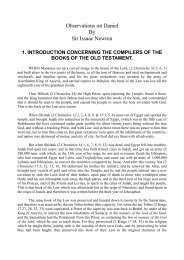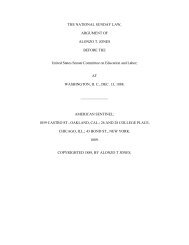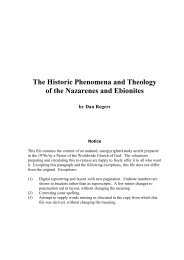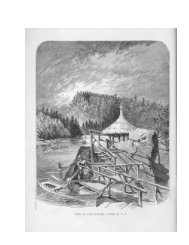Herman Hoeh Remembered-1-05.pdf - Origin of Nations
Herman Hoeh Remembered-1-05.pdf - Origin of Nations
Herman Hoeh Remembered-1-05.pdf - Origin of Nations
You also want an ePaper? Increase the reach of your titles
YUMPU automatically turns print PDFs into web optimized ePapers that Google loves.
The 50’s and 60’s seemed to spawn a mindset <strong>of</strong> a separation between “us and the<br />
world” in RCG/WGC circles. That mentality was conspicuously absent in <strong>Herman</strong> <strong>Hoeh</strong>. He<br />
consistently made contact with many individuals <strong>of</strong> varied backgrounds and different<br />
perspectives, building bridges across pr<strong>of</strong>essional, denominational, religious, national and<br />
ethnic lines. One was Rabbi Zvi Ankori who did his doctoral dissertation on the<br />
interpenetration <strong>of</strong> Judaism and Zoroastrianism. He invited Dr. Ankori into his home for an<br />
informal discussion with his students. I felt it to be an honor to be one <strong>of</strong> those invited. Dr.<br />
Ankori went on to become a well known author on Jewish issues. Another was Jean Pierre<br />
Hallet, the Belgian anthropologist and humanitarian who publicized the plight <strong>of</strong> the Pygmies<br />
in the Congo. He was author <strong>of</strong> Pygmy Kitabu. I saw him on several occasions at fundraisers<br />
to help the Pygmies. He always voiced his appreciation for <strong>Herman</strong> <strong>Hoeh</strong>’s help with<br />
printing a brochure on the Pygmies and fundraising assistance for the Pygmy Project.<br />
Another contact was with a Swedish-born biochemist and visionary, Dr. Eric Eweson. A<br />
pioneer in composting and waste management from the 1940’s, Dr. Eweson’s expertise led to<br />
the construction and installation <strong>of</strong> the “Eweson Digester” on the Big Sandy campus which<br />
turned garbage and other waste into fertilizer. His talk before an Ambassador student<br />
assembly opened my eyes to the potentialities <strong>of</strong> composting and the desirability <strong>of</strong> organic<br />
farming. Another well respected personality, a dentist named Dr. Royal Lee imparted much<br />
useful information at a student assembly on health and nutrition. His company, Standard<br />
Process Laboratories is a producer <strong>of</strong> high quality nutritional supplements. Many more<br />
contacts could be cited from various fields including historians, archaeologists and writers.<br />
Many people have benefited from the associates <strong>of</strong> <strong>Herman</strong> <strong>Hoeh</strong>.<br />
<strong>Herman</strong> <strong>Hoeh</strong> <strong>of</strong>ten spoke <strong>of</strong> his friendship with John Weidner, a Seventh Day<br />
Adventist, who owned two health food stores in Pasadena. He affectionately called him “his<br />
best friend in the world”. Mr. Weidner, a Belgian, shared some <strong>of</strong> his World War II<br />
experiences at an Ambassador student assembly. He was one <strong>of</strong> the many who rescued Jews<br />
during the Nazi occupation <strong>of</strong> France. Wanting the best foods for his family, he would<br />
frequently shop at Weidner’s Health Foods. One time my wife, Peggy was there while he<br />
was shopping. After paying, he told the sales lady to “Keep the change!”, throwing the whole<br />
sales staff into turmoil! They did not know how to handle that! Everyone agreed that<br />
<strong>Herman</strong> <strong>Hoeh</strong> was a very generous man!<br />
During the late 60’s the <strong>Hoeh</strong>’s moved from their South Orange Grove house in<br />
Pasadena to La Canada. A few years later they purchased two houses in Tujunga, California.<br />
One house for them and one for his library! He wanted as much as possible to return to his<br />
roots where he could have a garden and keep goats. After moving to Tujunga my wife and I<br />
gave them an old refrigerator in which to keep their garden produce and goat milk. After<br />
delivering it in our pick-up truck he stated, “You have treated us well, and now I have a treat<br />
for you!” He treated both <strong>of</strong> us to a refreshing glass <strong>of</strong> cold goat milk!<br />
I spoke by phone with <strong>Herman</strong> <strong>Hoeh</strong> about a month before he died. His mind was as<br />
sharp as ever. We chatted about many things. At first I hesitated to mention my years <strong>of</strong><br />
research into the meaning to the Christian <strong>of</strong> the feast days. Personal theological research by<br />
a lay person was once frowned upon. I did mention that I had felt for many years that there<br />
was much more meaning there than WGC had uncovered. He reacted favorably. I then said<br />
that my research was aided by several books on the feast days including one that predated<br />
HWA’s booklet. He asked who wrote it and I told him the author was Louis Talbot. He<br />
replied that he used to listen to him on the radio during the 1940’s, and wanted to know if he<br />
2

















